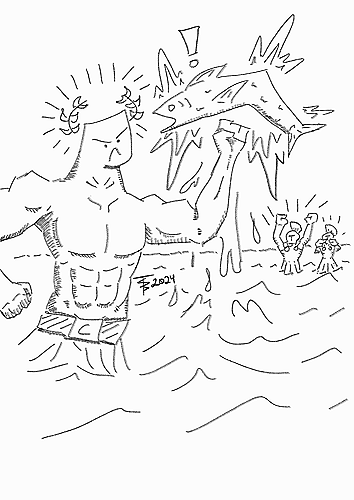Caligula’s War On Neptune: Fact or Fiction?
Written by Trevor Priesnitz
If you are a fan of history like me, there is a chance that you have seen or heard the fact that the Roman emperor Caligula (12-41 C.E.) once declared war on the sea god Neptune. In this war, Caligula would challenge Neptune himself in battle. After having his forces charge into the water, he ordered his men to “fight” the sea. Caligula himself allegedly swung his sword at the waves. One could attribute this to Caligula making a box of rocks look sensible. But, as somebody studying history, I could not help to think that this was a little much, even for a completely bonkers Roman emperor. So, like anybody with too much time on their hands and a lack of social hobbies, I went to the internet.
The first glowering piece of evidence that I discovered was a book known as I, Claudius by the English author Robert Graves. This was a piece of historical fiction from 1934 that detailed this war on Neptune. It seems that so many people have been tripped up by this fictional work that this segment has mistakenly been seen as fact. It also does not help that many online content creators will see such a “fact” and seek to share it in order to garner attention. I am guilty of this as well, as when I learned of this war on Neptune, I wanted to share it with as many people as possible. Before I started working on this article, I thought this was just going to be a fun analysis of a weird part of history. But, what this became was a warning to any aspiring historians like myself to be more wary of this kind of misinformation. If it smells fishy, you get the idea.
So, we know that the story of the war on Neptune was just a part of a novel. This means we can just dust ourselves off and stop listening to Trevor ramble like a crazed man in an Arby’s insisting that taxation is theft, right? Wrong! Because I want to know if Graves’ story about our buddy Claudius goring some fishies was based on any kind of factual events, so you are stuck with me. I was able to find some concrete evidence related to this incident, but there are only theories relating to the plausible perforation of piscium* for the prime purpose of purloining their precious plunder (*Latin for fishes).
So, the only good evidence that I have about Big C having beef with the big sea was when he was fighting Germanic tribes in the Rhine frontier around 39-40 C.E.. Those of you thinking, “wait didn’t Caligula die in 41 C.E.?” are probably thinking he died in battle or something. The real answer is people just didn’t like him, so he was killed by his own Praetorian guard. This is kind of relevant to this story we are talking about now because Caligula was not a great leader from the perspective of at least a few especially stabby Praetorians. So, in the Rhine, Caligula went to war with some Germanic people, but he didn’t prepare enough for this battle. So, he panicked and retreated his forces, blaming a bunch of his allies for being traitors who were rebelling against him. Some were killed, some paid him, and some were robbed by him (Barrett 2015). This made Caligula look like a big meanie but we cannot just call him a big meanie because that is not constructive criticism.
So, what does this battle in the Rhine have to do with fish? Well, nothing really, but this laughable decision by Caligula probably made him feel really stressed out that his soldiers saw him as an incompetent leader. We know that there was an invasion of Britain that Caligula had planned after the failed battle in the Rhine, but we do not know why it never happened. Some speculate that it was because Caligula canceled it. They were ill-prepared for Rhine, and therefore, they were likely ill-prepared for Britain. The other theory is that Caligula’s men were wary of getting on board the ships heading to Britain, because they feared a similar event to what happened in the Rhine just before.
From this point on, all that happens is pretty much just word of mouth from this guy named Suetonius. He was a historical writer who published the biographies of every Roman emperor, from Julius Caesar to Domitian. Suetonius wrote that when the invasion of Britain was halted, Caligula had all of his men lay down their equipment on the beach. Then, the men were to collect as many seashells as they could in their clothes and helmets. This bit of writing is all we have related to Caligula’s alleged war on Neptune. Not very fun, is it? But, why would Caligula order his men to do something like this? Even if it isn’t a war on the ocean itself, the idea of a bunch of Legionnaires playing on the beach collecting shells is still a bit hard to believe.
There are a few theories for why Caligula ordered his men to collect shells. The first theory I saw was that Caligula was just crazy. This theory is not a great one in my opinion, as it doesn’t really provide any kind of further thinking. The second theory I saw was that this was a tactic from Caligula to humiliate his soldiers for not daring to invade Britain. Collecting seashells on the beach would serve as a symbol that these men could only achieve such a small, childish victory. The third and most interesting theory that I saw was that this was a morale boosting exercise. Caligula may have made this order to act as a kind of leisurely break in order to calm his men down. This is enforced by the fact that when this ordeal was over, Caligula paid every one of his men one hundred denarii and sent them away (The Historian’s Craft 2022).
But, what if the order was never actually to collect sea shells? Some historians wonder if Suetonius used a word that could have a double meaning in order to demean Caligula. Because Caligula was assassinated, his reputation likely plummeted (The Historian’s Craft 2022). So, Suetonius would have wanted his writing to fit into this popular narrative. The wording used in Suetonius’ writing is very ambiguous as it uses a couple slang terms during this section. The Latin word “conchae,” which means seashell, was used when the men were ordered to collect this item. But “conchae” is also an ancient Roman slang term for female genitalia. One could see how it is more likely that an emperor would order his men to lay down their arms and go to the brothels for pleasure rather than collect seashells (Woods 2000). Another interpretation by historians is that the word “conchae” was not actually supposed to be used but “musculi.” This term can mean either seashell or military hut (Woods 2000). So, with this interpretation, Caligula would be telling his men to gather up camp and go home. Nonetheless, it cannot be ignored that the use of this slang could so easily be misconstrued in a humorous way that could have been intentional on Suetonius’ part.
I will admit, this research kind of disappointed me. I thought this would be a fun article talking about a crazy Roman emperor stabbing the ocean in order to piss off a salt-brined divine. But alas, most historians point towards a somewhat logical explanation. But, I would like to add a moral to this endeavor because that means I can call myself a good noodle. When looking at a piece of information branded as a fact, don’t ever be afraid to doubt it. I am not saying you should be a conspiracy theorist, but you should know how to use your resources in order to gain a better understanding. I don’t want any emails after this article goes out about how the Earth is actually shaped like a velociraptor or that Zac Efron is a mole-man on an above ground pilgrimage.
Sources:
Barrett, Anthony A. Caligula. Routledge, 5 Mar. 2015.
The Historian’s Craft. (2022, May 25). Stab the Water! Why did Caligula declare war on Neptune? Www.youtube.com; YouTube. https://youtu.be/ZCcoMAOwaSY?si=4O7tvK5mwRh1Bk4f
Woods, David. “Caligula’s Seashells.” Greece & Rome, vol. 47, no. 1, 2000, pp. 80–87. JSTOR, http://www.jstor.org/stable/826949. Accessed 24 Feb. 2024.
Featured Image:Trevor Priesnitz




